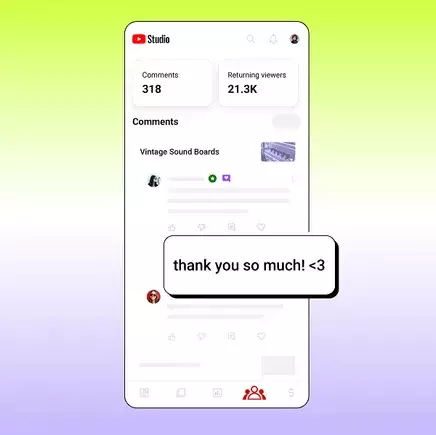YouTube has recently announced a trial program aimed at streamlining the interaction between creators and their audience through AI-powered reply suggestions. This initiative raises a critical question about the role of artificial intelligence in social media engagement: Are we risking the authenticity of human interaction in our quest for convenience and efficiency? While there is undeniable merit in easing the workload for content creators, the broader implications of such automation merit a thorough examination.
Understanding the Proposal
The proposal essentially involves supplying creators with AI-generated suggestions for replying to viewer comments in a manner consistent with their established tone and style. With the incorporation of machine learning algorithms, YouTube aims to analyze past interactions and generate responses that could save creators time and prompt them to engage more readily with their growing audience. In a world where social media is increasingly inundated with comments and interactions, this could indeed alleviate some of the burdens faced by creators, especially those with significant followings.
However, this innovation echoes the familiar auto-complete features prevalent in various applications like Gmail. On the surface, such features seem benign, yet they underscore a deeper trend of shifting emotional labor from human operators to automated systems. YouTube’s attempt to make engagement more spontaneous and effortless for creators may ultimately dilute the genuine nature of the dialogue that social media platforms were originally designed to foster.
The Double-Edged Sword of Efficiency
Undoubtedly, one of the key advantages of tools like AI-generated reply suggestions is time efficiency. For popular creators inundated with comments, maintaining engagement can be a daunting task. In these scenarios, the capability to harness AI to generate relevant replies could streamline interactions and bolster community relations. However, one must ponder: at what cost does this convenience come?
As platforms progress towards more automation, we face a risk of eroding the social fabric that underpins these digital spaces. The unique voice and personality that creators bring to their interactions could become overshadowed by generic, AI-generated responses. This transition towards automated engagement could gradually lead to “fake interactions,” where the essence of social media—authentically connecting with real people—becomes compromised.
Platforms like YouTube, and indeed others like Meta, are venturing into territories where artificial intelligence could streamline processes, from building chatbots to generating content in a user’s style. Yet this inclination toward automation raises significant ethical considerations regarding the quality of user interaction. The value of social media lies in its ability to foster meaningful connections, to allow individuals to share thoughts and emotions candidly.
As platforms lean into the automation trend, users may start to gravitate toward smaller, more intimate spaces where genuine conversation is prioritized over algorithm-driven responses. In a digital environment teeming with bot-generated replies, the authenticity of interactions can wane, pushing users to seek refuge in niche groups where they can find real dialogue rather than scripted engagement.
As we navigate this landscape, it’s crucial to strike a balance between efficiency and authenticity. While the demands placed on content creators are immense, we must prioritize the quality of social engagement over the speed with which we can respond. The conversation should remain genuinely human, underscoring the importance of personal touch in every interaction.
Creators should discern when it is appropriate to employ automation tools and when to maintain the authenticity of their responses. Perhaps a nuanced approach—leveraging technology while preserving the core values of human interaction—will yield the best outcomes.
While YouTube’s trial of AI-generated comment replies may seem convenient, it evokes critical reflections surrounding the authenticity of social connections. The potential risk of replacing human interaction with automated responses calls for a thoughtful approach to social media engagement. Rather than fully embracing AI in our conversations, we should foster environments where creators feel empowered to engage meaningfully with their audience. Only then can we truly preserve the essence of what makes social media a vibrant platform for sharing and connecting.

